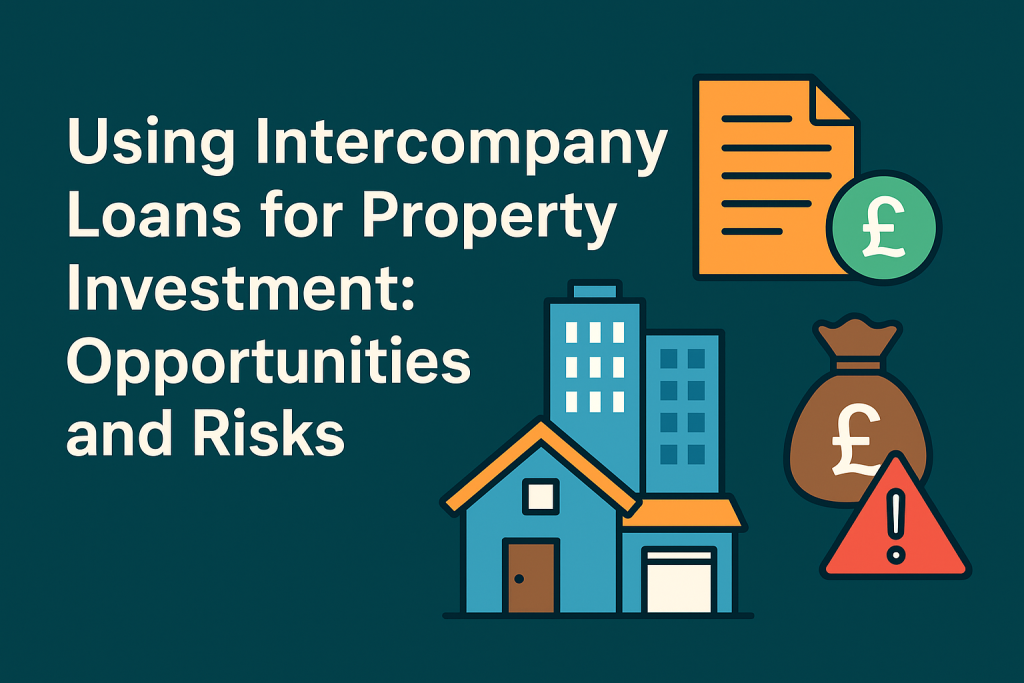
Using intercompany loans for property investment: opportunities and risks is an important topic for company directors, entrepreneurs, and C-Suite executives. Property is often seen as a reliable long-term wealth strategy, but financing it effectively requires careful planning. Intercompany loans are one option, offering flexibility and speed, but they also come with challenges that must be managed.
💡 What Are Intercompany Loans in Property Investment?
Simple Definition
An intercompany loan is when one company you control lends money to another, sometimes within a group structure. For property investors, this might mean that your trading business lends profits to a special purpose vehicle (SPV) that you’ve set up to purchase property.
Why Executives and Company Directors Use Them
- Keep control of capital
- Avoid reliance on external lenders
- Use retained profits more strategically
How Intercompany Loans Are Structured
- Typically documented with clear terms
- May include interest charges (often at commercial rates)
- Should be repaid in a reasonable timeframe
✅ Opportunities of Using Intercompany Loans for Property Investment
Greater Flexibility
Unlike bank lending, intercompany loans give directors full control over terms and repayment schedules.
Speed of Access
Funds can be moved quickly, helping you secure property opportunities without waiting for external approval.
Potential Tax Efficiencies
Interest payments can sometimes be deductible, but this depends on HMRC rules and professional structuring.
Diversification of Assets
Using retained profits to acquire property spreads risk and builds long-term wealth outside of the trading company.
⚠️ Risks of Using Intercompany Loans for Property Investment
Tax Implications
HMRC may scrutinise intercompany transactions to ensure they are at arm’s length. Poor structuring can lead to unexpected tax liabilities.
Cashflow Pressure
If one business becomes over-leveraged, it could harm your wider group’s financial stability.
Legal & Compliance Risks
Loan agreements must be clear, documented, and compliant with company law. Informal arrangements can cause problems later.
Interest Rate & Market Risk
Even if financing is smooth, falling property values or rising rates could damage returns.
🏢 Real-World Example of Intercompany Loans in Property Investment
Imagine you run a successful marketing agency with £300,000 in retained profits. You set up a property SPV and lend the profits to this company, which then purchases a buy-to-let property.
- Opportunity: You avoided commercial borrowing costs and moved quickly on the purchase.
- Risk: If the property underperforms, your trading business is left short of liquidity.
This example shows why balancing opportunity and risk is essential.
🔍 When Intercompany Loans Might Not Be the Best Option
Sometimes a traditional mortgage is more efficient:
- When interest rates are low
- When long-term security is needed
- When HMRC tax rules make intercompany structures less attractive
🛠️ Alternative Financing Options for Company Directors
If intercompany loans aren’t suitable, alternatives include:
- Commercial mortgages (long-term, fixed repayments)
- Director’s personal capital contributions
- Joint ventures with investors
📊 Final Thoughts on Using Intercompany Loans for Property Investment: Opportunities and Risks
Using intercompany loans for property investment: opportunities and risks highlights a balance of flexibility, speed, and control against tax, legal, and liquidity challenges. For executives and company directors, the key is professional advice — both tax and mortgage — to ensure the structure works for your goals.
📅 Next Steps for Company Directors
If you’re considering using intercompany loans for property investment, it’s crucial to weigh both opportunities and risks carefully. At Mortgage Links, we help company directors and executives design the right property finance strategy for their business and personal wealth.
👉 Book a meeting with us today to explore your options.






